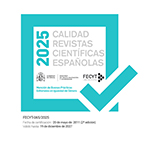La crisis del indigenismo clásico y el surgimiento de un nuevo paradigma sobre la población indígena de México
Resumen
La Revolución mexicana trajo consigo la implantación de la ideología del mestizaje y del indigenismo integracionista, que defendía la conveniencia de la integración en la sociedad nacional de las poblaciones indígenas. Pero, a finales de los años 60, en un marco internacional de protesta generalizada, comienza la crítica a las políticas gubernamentales en todos los ámbitos, teniendo especial importancia el desacuerdo respecto al indigenismo clásico. La matanza de Tlatelolco de 1968 constituirá un punto de inflexión en el clima de revuelta contra el poder establecido. A partir de entonces, las críticas cobran fuerza, generando una alternativa respecto al tratamiento a los indígenas, que desembocará en una nueva propuesta pluralista o multiculturalista, que valora la diferencia. En este artículo se describirán los sucesivos paradigmas con respecto a los indígenas que han tenido lugar desde la Revolución mexicana y, se tratará de apuntar algunas explicaciones acerca del cambio de ideología observado, con objeto de establecer una comparación entre la presente y el pasado, así como de valorar el alcance de dicho cambio.Descargas
Descarga artículo
Licencia
La Revista Complutense de Historia de América, para fomentar el intercambio global del conocimiento, facilita el acceso sin restricciones a sus contenidos desde el momento de su publicación en la presente edición electrónica, y por eso es una revista de acceso abierto. Los originales publicados en esta revista son propiedad de la Universidad Complutense de Madrid y es obligatorio citar su procedencia en cualquier reproducción total o parcial. Todos los contenidos se distribuyen bajo una licencia de uso y distribución Creative Commons Reconocimiento 4.0 (CC BY 4.0). Esta circunstancia ha de hacerse constar expresamente de esta forma cuando sea necesario. Puede consultar la versión informativa y el texto legal de la licencia.











